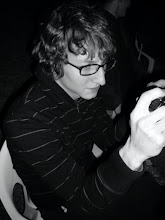Last Friday was Father’s Day in Spain, a national holiday which gives everyone the day off of work and thus a three-day weekend. In order to take advantage of this, two American friends of mine, Matt Walsh and David McCoy, along with Matt’s American roommate Tom from Maine, and 11 of their Spanish friends decided to go to Gijón.
Gijón is a coastal city in the north of Spain located in the Asturius region and is famous for its apple cider, beaches, and partying all night in the streets and plazas. While drinking outside of bars is frowned upon and even against the law in some parts of the country, it is almost a necessity in Gijón because of the fashion in which one drinks the cider. You see, you have to pour about a sip’s worth at a time from the bottle into a glass from holding the bottle above your head, making for about a two and a half foot pour. This will ultimately result in missing the glass at times (especially as the night carries on), so it makes since that it’s encouraged to be drank in the streets instead of the bars.
After a successful Thursday night of introductions to both Matt’s Spanish friends and the cider culture, we hit a bit of a speed bump on Friday morning. You see, Matt and Tom, who teach English in Segovia, have expired visas and had forgotten their passports at home. In hostels, it is standard procedure for everyone checking in to produce an international ID of some sort if you are not a citizen of that particular country. When Matt and Tom had no proper documentation, the police were informed about their illegal status and brought them to the station. However, given that Spain is in a financial crisis and didn’t want to pay for their deportation, they were told that they have 2 weeks to return back to the States. Fortunately, they were released and thus able to spend the rest of the weekend with us.
The weather in Gijón was fantastic, it was actually the first time since I arrived in Spain that wearing a jacket wasn’t necessary, and the warm sun was definitely welcomed. Gijón is supposed to have a really nice beach, but I wouldn’t know, because we never made it there. Instead, we decided to take advantage of the friendly and vibrant culture by hanging out in the streets and plazas all day with boxes full of bottles of cider with guitars and harmonicas in hand, singing songs and striking up conversations with the locals (especially the women, who are beautiful in Asturias).
Each day followed a similar routine: wake up around 1:30, eat lunch, start drinking around 3:00, play music and make up songs, and ultimately bar/club hop until about 5 am. This went on for three days and I must say it was one of the wildest and best weekends I have experienced in a long time. Now begins the countdown to Prague and Vienna for Easter.
Pics will be posted promptly

